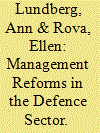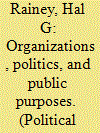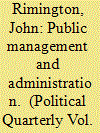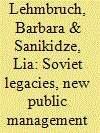| Srl | Item |
| 1 |
ID:
105374


|
|
|
| 2 |
ID:
185483


|
|
|
|
|
| Summary/Abstract |
The Swedish defence sector has for the last 30 years been subject to expenditure reductions and changed policy as well as management reforms inspired by the ideas of New Public Management (NPM). The purpose of this article is to provide insights into the major management reforms in the defence sector. We describe and discuss the reforms and the implications for the defence sector in the context of expenditure reductions and changed defence policy. We conclude that the earlier management reforms served as instruments to reduce defence expenditure and that the reforms have affected how agencies and the Government interact and how politicians are able to influence the sector. Furthermore, there are indications that these reforms have contributed to the management challenges we can observe in the defence sector today. These challenges correspond to important features of an efficient network. This implies that there might be a need of a different perspective to improve public management of the defence sector.
|
|
|
|
|
|
|
|
|
|
|
|
|
|
|
|
| 3 |
ID:
117540


|
|
|
|
|
| Publication |
2012.
|
| Summary/Abstract |
The title of this lecture refers to organizations, politics, and public purposes to emphasize developments in the analysis of public organizations and their management and the need for that analysis to include politics as an influence on those organizations. The Gaus Award recognizes contributions in the joint tradition of public administration and political science. Organizations serve as essential components of the administrative branch of government and of virtually all other aspects of human life and many other forms of life. Social scientists that I call "organization theorists" have developed theory and research about organizations and the people in them. This body of work provides concepts and insights useful for the analysis of the organizations in government, which I call "public organizations." Organizations play crucial roles in the pursuit of values and goals shared by large aggregates of people. "Organizations, Politics, and Public Purposes: Analyzing Public Organizations and Public Management" refers to these shared values and goals as public purposes. Organizations are essential to public administration and we cannot effectively analyze organizations in public administration without concepts developed by political scientists; we need to draw on political science.
|
|
|
|
|
|
|
|
|
|
|
|
|
|
|
|
| 4 |
ID:
092650


|
|
|
|
|
| Publication |
2009.
|
| Summary/Abstract |
Recently, British public management has relied too much on private sector approaches suited to market-facing situations, to the detriment of systems based on a realistic estimate of the special nature of public business, and its needs for economy and co-ordination. Accountability processes have suffered from over-simplification (targetry) and from a gross multiplication of mechanisms focusing on individual error, as opposed to ensuring intelligent assessment of business results. There has been an over-emphasis on management of inputs and outputs, as opposed to systems gearing the result-producing mechanisms to means for policy formation and co-ordination of effort. We need now to re-think and define properly the systems whereby ministers are advised, account is rendered, resources are allocated and effort is co-ordinated-and the qualifications of the relevant actors. Suggestions are made to these ends
|
|
|
|
|
|
|
|
|
|
|
|
|
|
|
|
| 5 |
ID:
087184


|
|
|
|
|
| Publication |
2009.
|
| Summary/Abstract |
As in many Asian, African, and Latin American countries, democratization and devolution reforms have characterized the recent development of public management in Indonesia. This article analyses the current development of "good governance" in Indonesian local government. The main objective is to assess the level of transparency, the mechanisms for hiding, and the extent of corruption in district budgeting and accounting. The empirical data consists of 200 in-depth interviews with members of the executive, legislative and civil society institutions in six districts. The article concludes that national systems and traditions of politics and bureaucracy have a strong negative impact on local administrative procedures, leaving only marginal space for regional variance and improvements. There is a remarkable lack of transparency, and checks and balances in public financial affairs are largely absent in all districts.
|
|
|
|
|
|
|
|
|
|
|
|
|
|
|
|
| 6 |
ID:
127678


|
|
|
|
|
| Publication |
2014.
|
| Summary/Abstract |
The article studies agencification and commercialisation within the Georgian police, specifically the Protection Police Department as the successor organisation of the old extra-departmental guards. Despite ostensibly having been scheduled for privatisation from 2004, this unit was instead expanded and strengthened. Given the centrality of police reform in establishing the Saakashvili government's reformist credentials, this represents a critical case testing the limits of top-down neoliberal reform within the very institution that was seen as its centrepiece. It also shows how neo-managerialist forms of organisation-in particular the public law agency-are used to camouflage what remains, essentially, Soviet-style organisation.
|
|
|
|
|
|
|
|
|
|
|
|
|
|
|
|
| 7 |
ID:
094309


|
|
|